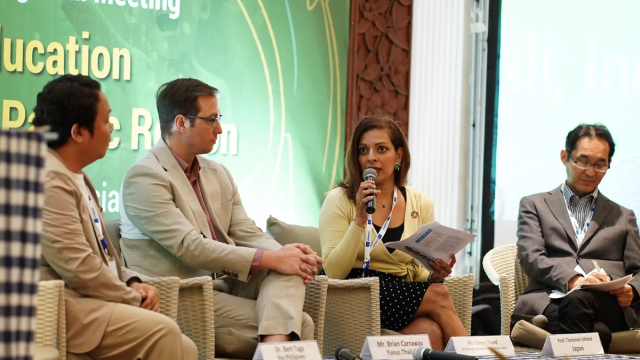Reflections on the UNESCO ESD-Net Asia Pacific Regional Meeting
In October 2022, UNESCO launched ESD-Net 2030, a new global network to advance Education for Sustainable Development (ESD) policy and implementation. This successor to the Global Action Programme (GAP) “aims to facilitate the implementation of the ESD for 2030 framework and its Roadmap by enhancing knowledge sharing, collaboration, mutual learning, advocacy, monitoring, and evaluation” among Member States, academia, civil society, and other education stakeholders.
In the wake of September 2022’s Transforming Education Summit and the ESD-Net launch, UNESCO has organized sub-regional and regional meetings to convene relevant stakeholders to advise countries in the development and implementation of “country initiatives” to mainstream ESD into national sustainable development efforts.
I was honored to represent SDSN at the ESD-Net Asia Pacific Regional Meeting in Bali, Indonesia, from June 12-14, along with colleagues Amber Webb and Karen Chand. The meeting brought together major stakeholders from across the region, including representatives from Ministries of Education and UNESCO National Commissions to present their ESD country initiatives and best practices. Presenting countries included Indonesia, Cambodia, Japan, the Republic of Korea, Thailand, Bhutan, Lao PDR, the Philippines, Bangladesh, Maldives, Timor-Leste, Pakistan, China, Kazakhstan, and Kyrgyzstan.
Country representatives from Uzbekistan, Malaysia, Tonga, and Samoa, along with speakers from UNESCO, UNICEF, the ASEAN Secretariat, the SEAMEO Secretariat, academia, and civil society, also participated in panel discussions about ESD-Net’s Priority Action Areas: policy, transforming learning environments, building capacities of educators, empowering and mobilizing youth, and accelerating local action.
Karen Chand, Director of Education Studies in SDSN’s Kuala Lumpur office, spoke on the panel about “building capacities of educators,” presenting the work of the Mission 4.7 Malaysia project and its upcoming pilot project to develop ESD training for all teachers in Malaysia.
I had the pleasure of speaking on a panel about the Greening Education Partnership alongside professors from Australia and Japan, a Ministry of Education officer from Singapore, and a scientist based in Vietnam. UNESCO’s Greening Education Partnership (GEP) is a multi-stakeholder initiative focused on “getting every learner climate-ready,” with focus areas in greening schools, greening curriculum, greening teacher training and education systems’ capacities, and greening communities.
While the GEP claims to take a lifelong learning approach, much of the conversation centers around the education of children and youth. In my remarks, I urged attendees not to overlook the needs of adult learners—the current working population—citing the SDG Academy’s growing portfolio of work in professional upskilling and the increasing demand for SDG education and training coming from the private sector. “Greening education” must be part of the “just transition” to a sustainable future, ensuring that no one is left behind as jobs and industries change. While the active participation of youth is vital to the achievement of the SDGs, the world cannot wait until those youth are in positions of power to achieve sustainable development. It is today’s decision-makers who can forge a path for the leaders of tomorrow, and I believe that any conversation about ESD must not take this for granted.
The country initiative presentations were encouraging and show that Member States across the region are already taking action to address ESD in their education policies; however, I thought that the most productive parts of the meeting were the breakout sessions, where delegates were able to discuss concerns, frustrations, and limitations with peers and experts from across the region.
The closed-door format allowed for a more open and honest discussion, and by the end of the three days, I felt that a sense of camaraderie had grown among the attendees, and that the network convened by UNESCO could truly facilitate the kind of active knowledge-sharing that will support countries in their ESD journeys.
A final highlight of the ESD-Net Regional Meeting was a site visit to local schools. I was in the group that visited SMK Negeri 3 Denpasar, a vocational high school where, alongside their academics, students learn the skills necessary to thrive in Bali’s tourism-driven economy.
In addition to the vocational skills, students are encouraged to participate in arts and cultural activities that showcase the enduring importance of Balinese heritage, including local knowledge and sustainable practices.
The meeting concluded with recommendations for UNESCO on how to expand the work of ESD-Net, with implementation and monitoring mentioned repeatedly. Policy alone will not change education; it must be implemented as well. Likewise, ESD monitoring must not measure educational outcomes alone; it must take a long term view of societal transformation, assessing the population’s change in behaviors, attitudes, and values as a result of its transformed education.
Overall, the meeting was a reminder of both how far we’ve come and how far we’ve yet to go when it comes to ESD in the Asia-Pacific. And yet, the openness and dedication displayed by the participants over these three days gives me hope that, together, we are on the right track.
